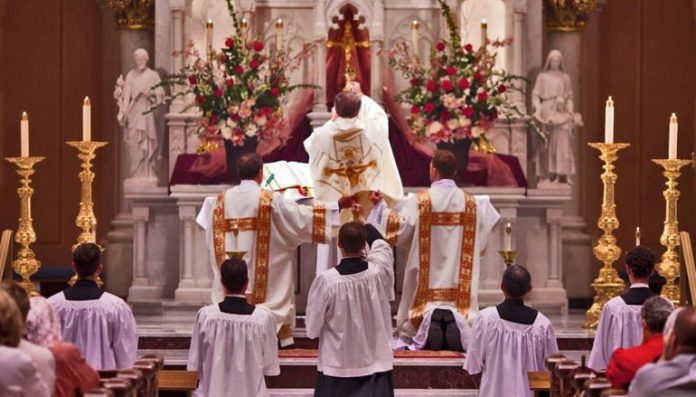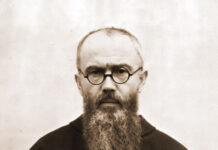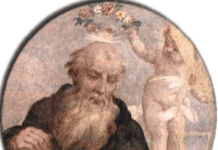‘Come to me, all you that are weary and are carrying heavy burdens, and I will give you rest. Take my yoke upon you, and learn from me; for I am gentle and humble in heart, and you will find rest for your souls. For my yoke is easy and my burden is light’ (Mt. 11:28-30). ⧾
These are assuredly among the most consoling and challenging words found in Sacred Scripture. With them Our Lord invites us to come to Him in our struggles and trials and to conform ourselves to His Most Sacred Heart. This simple invitation tells us everything we need to know about God and about ourselves. Our Lord reveals Himself as a Teacher whom we can imitate; and by consequence, that we are disciples who can indeed learn from Him and become godly in both our thoughts and actions. This divine initiative, since it comes from God, affirms our human nature for at the natural level, it is necessary for us to learn skills to survive and prosper. This is a self-evident truth. At the supernatural level, that is to say, in relation to the soul or what we commonly term the spiritual life, the very same is true. We learn to pray, to practice the virtues; we grow in the spiritual life just as we endeavour to grow and mature intellectually and morally. It is possible for us to have the mind of Christ (Cf. 1Cor. 2:16).
To live is to change and to be perfect is to have changed often. These are the wise words of St John Henry Newman, whose own spiritual journey to the fullness of the truth and to the Heart of Jesus was like our own spiritual journey, a passage from shadows and images to the truth. Where do we learn these saving truths? Principally at the celebration of the sacred liturgy which is both the school and feast of faith. The liturgy is rightly to be seen as the beginning of all things. The state of the liturgy tells you the state of the Church; and the restrictions imposed on our worship by the current state of affairs tell us something about the Church’s ability to function freely and effectively in our day. Nevertheless, we are witnessing and experiencing a singular phenomenon, at least from my perspective. Record numbers are attending the Traditional Latin Mass. Since the churches have reopened, the average attendance at our Friday evening Traditional Mass has been about one hundred people. The beauty and stability of the Traditional Roman Rite are a sane alternative to all of the directives, strictures and cautions imposed by what is fast developing into a new rite of sorts; what I term ‘the rite of Covid’, or ritus covidensis for those who wish to give it a more dignified sounding name.
Year in and year out we celebrate the Mystery of Christ; Sunday after Sunday and on the great Feasts of the Church we submit to the Mystery of God not in bondage but in a transformative communion that brings about our growth in holiness or Christian perfection. Our Lord assures us: No longer do I call you servants, for the servant does not know what the master is doing; but I have called you friends, for all that I have heard from my Father I have made known to you (Jn.15:15). It is here, in the encounter with the Living God that He reveals everything to us: the truth about Himself, the truth about the human person and our purpose. What we are given is a vision for life, one of meaningful purpose. It is good for us to be especially mindful of this as we witness the willful destruction of the monuments of tradition predominantly by ignorant and poorly educated youth, the victims of cultural Marxism. Cancel culture destroys and has nothing to offer besides a perpetual state of discord; the antithesis of Christian order.
‘Learn from me; for I am gentle and humble in heart, and you will find rest for your souls’. We are at the school of the Saviour. For all of us, the celebration of the Holy Sacrifice of the Mass on Sundays, on the great Feasts of our Faith and daily even, this is the source and summit of our Christian life. The Mass is always both the feast of faith and the school of faith. At this school, all of us, no matter how young or old, we strive for and work towards the unity of faith and life, an integrated life; and this we well know, is the work of a lifetime for to live is to change and to be perfect is to have changed often. True theology, that is to say, a correct understanding of the nature of God, and by consequence, a correct understanding of the human person, is both the cause and the sign of human sanity. If we contradict divine revelation and the Church’s tradition we end up in sheer insanity, as we are sadly witnessing today; and we risk losing ourselves and what is worse, our eternal salvation.
The way of Christian discipleship which we have undertaken to follow individually and collectively is a journey to the Heart of God. Our Lord issues His invitation in the Gospel today: Take my yoke upon you, and learn from me; for I am gentle and humble in heart, and you will find rest for your souls. In a treatise on Christian perfection St Gregory of Nyssa observes: Our life is stamped with the beauty of His thought….The mind of Christ is the controlling influence that inspires us to moderation and goodness in our behaviour. As I see it, Christian perfection consists in this: sharing in the titles which express the meaning of Christ’s name, we bring out this meaning in our minds, our prayers and our way of life (The Liturgy of the Hours, Vol. III, p. 396). We share in the titles which express the meaning of Christ’s name by receiving the gift of salvation which the Father lavishes on us in Christ. Anointed for service, and sharing in His mission as Priest, Prophet and King, we actively cooperate in the work of salvation, our own and that of the whole world. What a privilege it is for us to be one with Christ Our Lord in His saving work. May our devout and reverent reception of the Holy Eucharist draw us ever more intimately into Our Lord’s
Most Sacred Heart; that we may learn from Him who is gentle and humble in heart, and day by day bring our conduct closer to the life of heaven (Prayer over the Offerings, 14th Sunday Per Annum, The Roman Missal).












